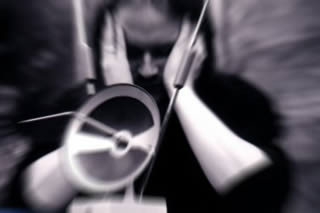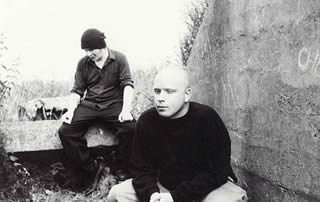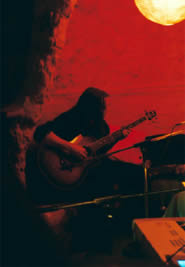“Lights Out” is Antimatter’s second full length album: an original and personal mix of electric, digital and acoustic sonorities.
This is an interview with Duncan Patterson (Antimatter’s songwriter with Mick Moss).
Fabrizio Garau (FG): After two albums (and an acoustic live album), what are your feelings towards the whole Antimatter experience?
Duncan Patterson (DP): I’m glad to be in a position to be releasing albums again on a regular basis. We’ve worked hard over the last few years and it seems to be paying off now. My main concern now is lack of distribution, which is something we will have to fix with the companies we work with.

FG: Antimatter is you and Mick Moss. How could you describe your artistic relationship?
DP: Our writing styles are fairly different but fit together well. The albums are proof of that. Mick’s songs are more like songs, whereas my stuff drifts off somewhere else. The styles are compatible though.
FG: How did you increase your musical skills during these years? I’m asking this because in “Lights Out” we find many different instrumental solutions (acoustic, electric, digital.)
DP: There’s no rules in our music so we just choose suitable sounds or instruments, depending on what feels right. There’s no increase in skill or technical ability, it’s all in the mind.
FG: On one hand, you use a lot of electronics and samples; on the other hand, it seems that you have a strong interest in acoustic music (in “Lights Out” you propose an acoustic and striking version of “Everything you know is wrong”). According to your opinion, what are the feelings that only acoustic guitar permit to express?
DP: Acoustic guitars sound nice, simple as that. I write most of my stuff on acoustic guitar, so does Mick. I like doing different versions of tracks in a simplified way and its nice to have these versions available to people too. When we play live we just use acoustic guitars, bass and piano and it creates a laid back atmosphere, which I prefer to standing on a stage with loads of people looking up at you, shouting.

FG: Portishead is one of my favourite bands. I perceive some similarities between “Lights Out” and this group, especially in the use of percussions. What did you “learn” (sorry for this term) from trip hop?
DP: I’m not a big Portishead fan, neither is Mick. It must be the easiest thing to associate us with or something, female vocals, electric piano etc… I don’t really see the connection.
FG: This album has a strong lyrical unity: personally, I perceived “Lights Out” as a work on the absence of truth, especially in human relationships. What do you think about it?
DP: Well, I know what the lyrics are about, obviously. The lyrics are there in black and white, and they’re not too cryptic to get an idea what its all about. Again it’s based around disappointments in people.
FG: I associate your band to words like “intimacy” or “introspection”. In “The art of a soft landing”, Hayley Windsor says: “I’m building a cage to chew things over”. Does this kind of be’aviour come more from your inner selves or is it caused by the historical/social context in which you live?
DP: Both, its not self-pitying fiction or something (if such a thing exists), the lyrics are based on our experiences in life and what we observe.
FG: An unoccupied chair in the dark is the main theme of the album’s artwork. What does it symbolise?
DP: It symbolises that someone is not in the chair anymore, and the lightbulb is swinging.
 FG: A little curiosity: why did you choose to appear as vocalist on the title track? Are you particularly bounded to this song?
FG: A little curiosity: why did you choose to appear as vocalist on the title track? Are you particularly bounded to this song?
DP: Well, I’m close to all the stuff I write but I don’t like singing. I liked the way all the vocals turned out on the title track though so we kept my vocal in the mix.
FG: Listening to his touching interpretation, it seems to me that Mick Moss has a strong involvement with “In Stone”. Did you speak with him about this song?
DP: It would be better for Mick to explain his own songs. He has a strong involvement in everything he writes otherwise he wouldn’t write it, plus he understands what I write about.
FG: I have never met you, but if I had to introduce you to a friend of mine, I would describe you as “independent” and “open minded”. Have these two adjectives a particular importance in your (musical) life?
DP: Yeah, that would be an accurate description.


This piece of writing is genuinely a fastidious one it assists new
the web viewers, who are wishing for blogging.